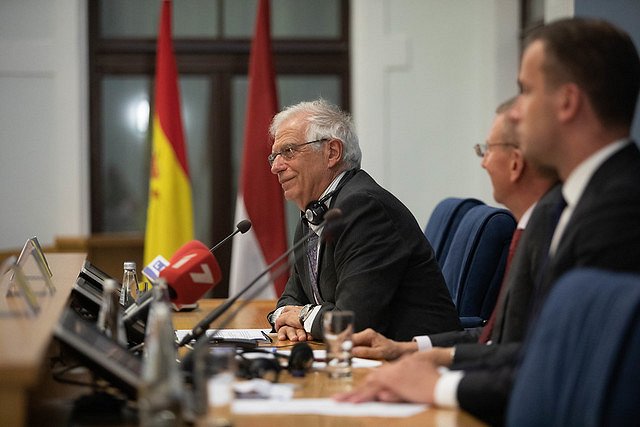Spanish Foreign Minister Josep Borrell Fontelles came to Rīga for a working visit and, as the tweet below shows, even gave a free ride to Latvian Foreign Minister Edgars Rinkēvičs from a meeting in Helsinki.
The ministers will discuss bilateral co-operation, current developments in the EU and security policy, as well as exchange views on developments in the EU's southern and eastern neighborhood.
The Spanish Foreign Minister, a member of the Socialist Workers' Party in Spain, has been nominated to succeed Federica Mogherini as High Representative of the European Union for Foreign Affairs and Security Policy, though his appointment is subject to approval by the European Parliament in the autumn.
Aterrizando en #Letonia junto a mi homólogo, el MAE @edgarsrinkevics, con el que mantendré una reunión de trabajo en #Riga. Antes visitaré las tropas españolas que prestan servicio en la base de #Adazi. pic.twitter.com/2aFo8YY296
— Josep Borrell Fontelles (@JosepBorrellF) August 30, 2019
As well as meeting officials he will visit the Ādaži Military Base to meet with troops from the Spanish contingent of NATO's expanded presence in Latvia. More than 300 Spanish soldiers from the Mechanized Infantry Company are serving in the NATO Multinational Battle Group in Latvia. Spain has also equipment in Latvia including Leopard tanks, Pizarro infantry vehicles, support equipment, and engineering and logistics equipment.
The multinational battle group in Latvia is led by Canada and consists of more than 1,300 soldiers from Albania, the Czech Republic, Italy, Poland, Canada, Slovakia, Slovenia, Montenegro and Spain, rotating in Latvia, and has been operational for more than two years 2017 at the Ādaži base.
To get a feel for the Spanish military presence in Latvia, you might like to revisit this short film about life in a Pizarro fighting vehicle.
Earlier this year the Spanish navy was also operating in Baltic waters, as reported by LSM.
?A brief photo report of the visit of ??Spanish Foreign Minister, @JosepBorrellF, to the ??@Latvian_MFA & a meeting with @edgarsrinkevics ➡https://t.co/VJsxR5QcLO pic.twitter.com/RTShPpd74I
— Latvian MFA (@Latvian_MFA) August 30, 2019
Following a meeting between the two Foreign Ministers, the Latvian MFA issued a statement saying:
The Ministers expressed satisfaction with the close relations between Latvia and Spain also evidenced by Spanish participation in the NATO battle group stationed in Ādaži.
Their further discussion focused in particular on issues of current importance for the European Union, in view of Josep Borrell Fontelles’ nomination as High Representative of the Union for Foreign Affairs and Security Policy. Shared priorities for Latvia and Spain in negotiations on the EU Multiannual Financial Framework are the Cohesion Policy and the Common Agricultural Policy: we must continue standing up for the convergence of direct payments and sufficient funding for rural development. Unity and preparedness for all scenarios should also be maintained in the talks with the United Kingdom on its withdrawal from the EU and building future relationship.
The Ministers also discussed the ways to improve the effectiveness of the EU’s Common Foreign and Security Policy and cooperation with countries in the EU neighborhood. We call for strengthening the role of Member States in taking decisions on the European Union’s external relations and security, said Edgars Rinkēvičs. The Latvian Foreign Minister underlined that the unity of the EU was indispensable for pursuing the Union’s priorities and maintaining its credibility.
The parties also concurred that equal attention should be paid to the EU’s Eastern and Southern neighborhoods through continued contribution to stability and security in those countries. In a discussion on tensions in the Persian Gulf and Iran’s commitments under the JCPOA (Joint Comprehensive Plan of Action to restrict Iran’s nuclear program), Minister Rinkēvičs highlighted the importance of dialogue between the EU and the United States.
The Ministers then exchanged views on current developments concerning NATO and the EU’s Common Security and Defence Policy, and they focused on risks caused by cyber-attacks and disinformation. Edgars Rinkēvičs stressed in particular that in the fight against disinformation Latvia supported closer contacts between EU and NATO institutions as well as transatlantic cooperation. When discussing the security situation in the region, the Minister thanked Spain for its participation in the NATO battle group in Ādaži and the Baltic Air Policing mission, which is an excellent example of Allied solidarity.
The statement did not quote either man directly, nor mention if events in Catalonia had been on the agenda.
El MAEUEC @JosepBorrellF se encuentra de visita de trabajo en Letonia, habiendo mantenido un primer encuentro con su homólogo @edgarsrinkevics. Dicha visita es muestra del buen estado de las relaciones bilaterales, entre países amigos y aliados ???? pic.twitter.com/3z8FuCeGfd
— EmbajadaEspañaLetonia (@EmbajadaEspRiga) August 30, 2019




























